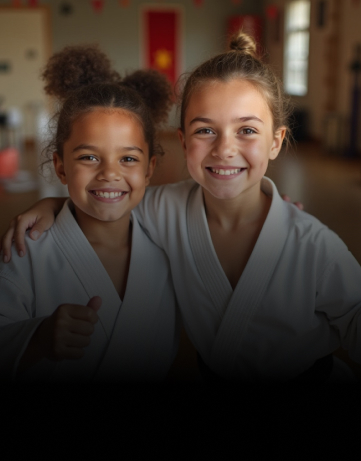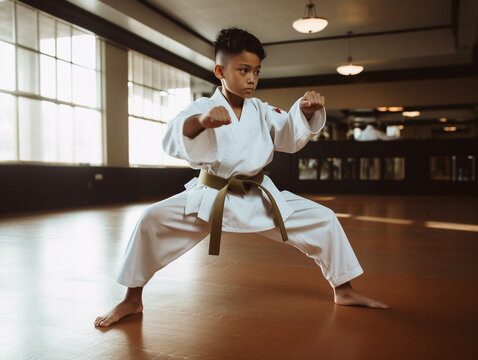Martial Arts for Kids – More Than Just Physical Moves, It’s Character Development
Just How Martial Arts for Kids Can Boost Self-confidence and Technique in Young Martial Artists
Karate for youngsters supplies a distinct possibility to construct confidence and self-control in young martial musicians. As they learn new methods and face difficulties, they not just get abilities yet also establish a solid feeling of self-regard. This structured environment encourages them to respect the trip of improvement. Just how does this training convert into their everyday lives? Discover the deeper links that make karate greater than simply a sporting activity.
The Value of Self-confidence in Youth Advancement
Confidence is a necessary structure block in youth advancement. When you nurture your child's self-worth, you empower them to deal with difficulties, take dangers, and reveal themselves easily. Youngsters with confidence are much more ready to explore new activities and social scenarios, which can result in lasting relationships and useful experiences.Encouraging your kid to get out of their convenience area promotes resilience. They find out that failure isn't the end yet instead a stepping stone to success. By commemorating their success, no issue how tiny, you assist them recognize their capacities and worth.In this journey, assistance and favorable support from you play a crucial function. Whether it's through appreciation or merely being existing, your involvement enhances their confidence. As they expand, this self-assurance becomes a lifelong possession, furnishing them to browse both difficulties and possibilities with a strong feeling of self.
How Martial Arts Instructs Technique and Focus
Martial arts assists you build self-control and focus via its structured training program. As you exercise mindfulness throughout each session, you'll discover to focus much better both on and off the floor covering. Plus, establishing and achieving objectives in martial arts strengthens your capacity to stay dedicated and attentive.
Structured Training Regimen
While you participate in karate training, you'll rapidly uncover how an organized regimen imparts technique and focus in young professionals. Each course adheres to a particular style, consisting of warm-ups, method method, and sparring. This consistency instructs you to dedicate and appreciate the procedure to improvement. As you learn methods and kinds, you create a sense of responsibility for your own progress.The structured atmosphere urges you to establish objectives, whether understanding a brand-new belt or refining a kata. You'll discover that remaining concentrated during drills and classes hones your concentration. The self-control you grow in martial arts expands past the dojo, positively impacting your schoolwork and everyday routines. Each session strengthens the value of commitment, assisting you become a much more regimented individual.
Mindfulness in Method
As you practice karate, you'll find that mindfulness becomes a crucial part of your training. Each step needs your complete focus, aiding you remain concentrated on the here and now moment. You'll learn to ignore diversions and focus on your breathing, activities, and purposes. This enhanced understanding hones your reflexes and enhances your discipline.During sparring or forms, you'll uncover the value of being psychologically existing - Karate Salisbury MD. You'll observe exactly how this focus not just boosts your method but also builds your self-confidence. By exercising mindfulness in karate, you cultivate perseverance and strength, necessary qualities that prolong beyond the dojo. By doing this, karate teaches you to harness your mind, aiding you establish a disciplined technique to challenges both on and off the floor covering

Personal Goal Setting Techniques
Establishing objectives in karate isn't nearly making belts; it's an effective way to grow technique and focus. When you establish particular, possible targets, you produce a roadmap for your progression. For example, as opposed to simply aiming to enhance your kicks, attempt concentrating on mastering a specific method every month. This approach keeps you inspired and engaged.Breaking down bigger objectives right into smaller, workable actions helps you track your development and commemorate tiny triumphes along the road. Whether it's improving your position or boosting your sparring endurance, every objective enhances your dedication. As you achieve these goals, you'll build confidence in your skills and establish a strong sense of self-control that extends beyond the dojo right into daily life.
Structure Durability Via Martial Arts
Martial arts, especially martial arts, uses youngsters a distinct possibility to build strength in an encouraging setting. In classes, they deal with obstacles that press their limits, whether it's sparring or grasping a brand-new technique with a companion. Each trouble, like a missed out on kick or a lost match, becomes a chance to find out and grow.As they exercise, youngsters learn to welcome pain and maintain attempting, also when things obtain challenging. They find that failing isn't the end; it becomes part of the trip. This attitude helps them jump back stronger, not simply in the dojo, but in daily life.With each obstacle they get rid of, your youngster blog develops confidence in their capability to tackle barriers, sustaining their decision. Through karate, they'll comprehend that durability isn't nearly physical stamina; it's about mental grit and perseverance, equipping them to face whatever life tosses their method.
The Role of Respect in Karate Training
Respect is a fundamental principle in karate training, fostering a culture of discipline and camaraderie among trainees. When you tip onto the dojo flooring, you're not just discovering strategies; you're likewise finding out to respect your instructors, peers, and the art itself (Karate Salisbury MD). Bowing at the start and end of class isn't simply a procedure; it signifies your recommendation of others' initiatives and dedication.As you develop shared regard, you'll find it boosts your understanding experience. You'll listen more attentively to your instructor and gain understandings from fellow trainees. This setting encourages useful criticism and support, allowing everybody to grow together.Moreover, regard grows self-discipline. Identifying the worth of effort and humility helps you stay concentrated on your training. Subsequently, this respect equates into your daily life, enhancing your interactions and connections outside the dojo. Via martial arts, you discover that regard is essential for individual development and area structure
Establishing Goals and Accomplishing Success in Karate

Social Skills and Team Effort in the Dojo
While training in the dojo, children normally create necessary social abilities and teamwork capacities. As they exercise together with peers, they discover to connect effectively, share room, and support each other. Each course offers possibilities for cooperation, whether it's during companion drills or team workouts. This teamwork promotes friendships and creates a sense of belonging, making the dojo a nurturing environment.Kids also gain useful conflict resolution skills. When nhl games today they experience obstacles, such as arguments during sparring, they learn to navigate these situations constructively. They exercise perseverance and empathy, understanding that everybody has various toughness and weaknesses.Moreover, taking part in group tasks cultivates a sense of responsibility. You'll see your youngster learning to count on teammates and take obligation for their role in a team. These experiences not only improve their martial arts journey however also outfit them with social tools they'll carry right into other areas of life.

The Long-Term Advantages of Karate Beyond Childhood Years
As children mature and shift right into the adult years, the advantages of karate expand much past the dojo. You'll locate that the discipline and emphasis discovered through martial arts can convert right into your academic and professional life. Establishing and attaining goals in martial arts fosters a strong job principles, which can press you to master any kind of endeavor.Moreover, the self-confidence obtained from grasping methods and sparring can improve your self-esteem, helping you tackle obstacles head-on. This strength becomes invaluable as you encounter the uncertainties of adulthood.Additionally, the social skills established via team effort and sociability in the dojo can cause far better partnerships in both expert and personal balls. You'll discover to interact efficiently, willpower problems, and construct an encouraging network.Ultimately, karate shapes not just competent martial musicians, but well-shaped individuals all set to take on the world.
Regularly Asked Questions
What Age Is Finest to Begin Martial Arts for Children?
You can begin karate as very early as age 4 or 5, but it commonly relies on your kid's maturation and rate of interest. Finding a class that suits their age and energy level makes a big difference.
Are There Any Kind Of Wellness Advantages From Exercising Karate?
Yes, exercising karate offers many health and wellness advantages. You'll boost your control, adaptability, and toughness while boosting cardiovascular health and fitness. Plus, it boosts focus and mental health, making it a wonderful option for general physical and mental health and wellness.
Exactly How Frequently Should Kids Go To Karate Courses?
You should motivate your youngsters to attend karate courses at the very least two to three times a week. Uniformity aids them discover methods efficiently cardinals nfl and establish abilities, making their experience a lot more gratifying and pleasurable over time.
Can Karate Help With Handling Stress And Anxiety in Children?
Yes, martial arts can help take care of anxiousness in children. It teaches focus and self-control while supplying a safe outlet for power. You'll see your child growing more tranquil and positive as they practice routinely.
What Equipment Is Required for Children Beginning Karate?
